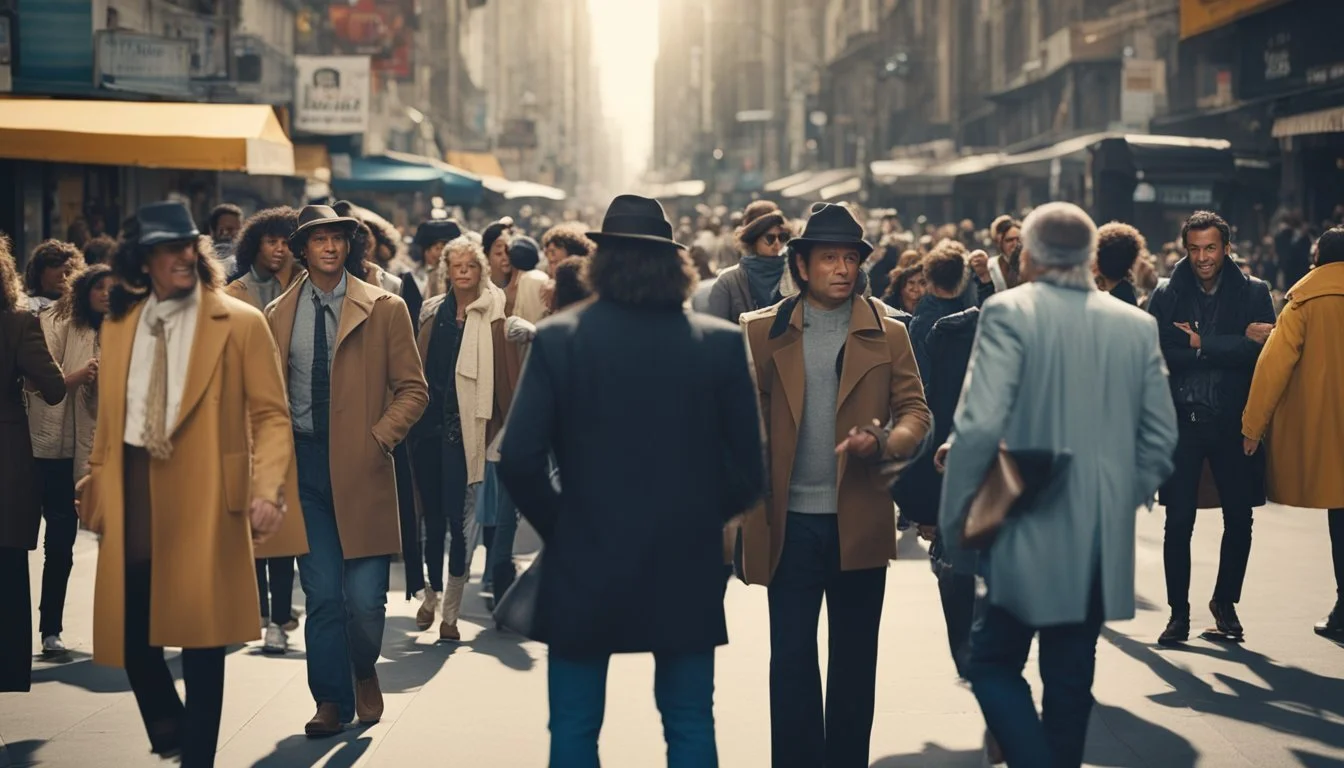Fact and Fiction Blur in 'Searching for Sugar Man' as Rodriguez's Legend Resurfaces
'Searching for Sugar Man' captivated audiences with its tale of a forgotten musician's unlikely rise to fame. The 2012 documentary follows the journey of two South African fans seeking to uncover the truth about Sixto Rodriguez, an American singer-songwriter rumored to have died years earlier. While the film presents a compelling narrative of rediscovery, it blurs the line between fact and fiction in its portrayal of Rodriguez's career and impact.
The documentary paints Rodriguez as an obscure artist who found unexpected stardom in South Africa while remaining unknown in his home country. It chronicles the efforts of music enthusiasts to track down the elusive performer and bring him back into the spotlight. The film's storytelling prowess earned it critical acclaim and an Academy Award, cementing its place in documentary film history.
Questions have arisen about the accuracy of certain elements in 'Searching for Sugar Man'. Critics point out that Rodriguez had a more substantial career than the film suggests, with tours in Australia and continued musical activity in Detroit. These discrepancies highlight the complex relationship between storytelling and historical accuracy in documentary filmmaking.
The Enigma of Rodriguez
Sixto Rodriguez, an American singer-songwriter from Detroit, became an unlikely musical legend shrouded in mystery. His story captivated audiences worldwide, blending fact and fiction in a tale of obscurity, rediscovery, and unexpected fame.
Early Life and Musical Beginnings
Born in 1942 to Mexican immigrant parents, Sixto Rodriguez grew up in Detroit's inner city. He began performing in local bars and clubs in the 1960s, developing a unique folk-rock style influenced by the city's industrial environment.
In 1970, Rodriguez released his debut album "Cold Fact," followed by "Coming from Reality" in 1971. Despite critical acclaim, both albums failed commercially in the United States. Discouraged by the lack of success, Rodriguez stepped away from the music industry.
The Mystery of His Disappearance
After his brief recording career, Rodriguez vanished from the public eye. Rumors circulated about his fate, with some fans believing he had died by suicide on stage. This myth gained traction, particularly in South Africa, where his music had become wildly popular unbeknownst to him.
For decades, Rodriguez remained unaware of his international success. He worked various jobs in Detroit, including construction and demolition. His rediscovery in the late 1990s sparked a resurgence of interest in his music and life story.
The search for Rodriguez, documented in "Searching for Sugar Man," revealed the truth behind his disappearance and brought his talent to a new generation of listeners.
The Cultural Phenomenon of 'Searching for Sugar Man'
'Searching for Sugar Man' captivated audiences worldwide with its remarkable story of rediscovery. The documentary's unexpected success transformed it into a cultural touchstone, sparking conversations about forgotten artists and the power of music.
Creating the Documentary
Swedish director Malik Bendjelloul crafted 'Searching for Sugar Man' with a blend of mystery and musical appreciation. He stumbled upon the story of Rodriguez, an American singer-songwriter who had unknowingly become a cultural icon in South Africa. The film traces the journey of two South African fans determined to uncover the truth about Rodriguez's fate.
Bendjelloul's approach combined interviews, archival footage, and animated sequences to bring the narrative to life. He faced numerous challenges during production, including limited funding and the need to shoot some scenes on his iPhone.
Awards and Global Recognition
'Searching for Sugar Man' premiered at the 2012 Sundance Film Festival, where it won the Special Jury Prize and the Audience Award for World Cinema Documentary. This initial success paved the way for wider distribution and critical acclaim.
The film's crowning achievement came at the 85th Academy Awards, where it won the Oscar for Best Documentary Feature. This recognition catapulted the documentary and Rodriguez's story into the global spotlight.
'Searching for Sugar Man' resonated with audiences across cultures, rekindling interest in Rodriguez's music. The film's success led to sold-out concerts and a resurgence in album sales, firmly establishing Rodriguez as a rediscovered legend in the music world.
The Music of Rodriguez
Rodriguez's music blends folk-rock with poetic lyrics and social commentary. His distinctive voice and songwriting style captivated audiences, particularly in South Africa.
Influences and Lyrical Themes
Rodriguez drew inspiration from folk and blues traditions, infusing his music with introspective and socially conscious themes. His lyrics often addressed urban decay, poverty, and political corruption. The song "Sugar Man" became an anthem, with its enigmatic portrayal of a drug dealer.
Rodriguez's gravelly voice and acoustic guitar-driven sound evoked comparisons to Bob Dylan. His music resonated strongly with anti-apartheid protesters in South Africa, who found solace and inspiration in his words.
The Impact of 'Cold Fact' and 'Coming from Reality'
Rodriguez released two studio albums: 'Cold Fact' (1970) and 'Coming from Reality' (1971). These records showcase his unique blend of folk-rock and psychedelic elements.
'Cold Fact' features some of Rodriguez's most beloved songs, including "Sugar Man" and "I Wonder." The album's production, helmed by Dennis Coffey, added depth to Rodriguez's raw talent.
'Coming from Reality' further expanded Rodriguez's sonic palette. While less commercially successful initially, it gained recognition following the release of 'Searching for Sugar Man.'
Both albums found a devoted audience in South Africa, where they became unofficial soundtracks to the anti-apartheid movement. Rodriguez's music provided a voice for those yearning for social change.
Rodriguez's Resurgence and Tour
Rodriguez's rediscovery led to a remarkable career revival. His newfound fame sparked tours across multiple continents, transforming him from an obscure musician to an international sensation.
Rediscovery and Revival
Rodriguez's music found a passionate audience in South Africa during the 1970s and 1980s. Fans believed he had died, but two South African fans uncovered the truth in the late 1990s. This revelation led to Rodriguez's first tour of South Africa in 1998, where he played to packed stadiums.
The 2012 documentary "Searching for Sugar Man" catapulted Rodriguez to global recognition. The film won an Academy Award, further amplifying interest in his story and music.
Impacts of the Revival on His Career
Rodriguez's career experienced a dramatic turnaround. He embarked on tours across Australia, the United States, and Europe. In South Africa, he achieved a level of stardom comparable to major rock icons.
His concerts drew thousands of fans, with memorable performances in Cape Town and other cities. Rodriguez's family joined him on some tours, experiencing his long-overdue success firsthand.
The revival introduced Rodriguez's music to new generations. His albums were reissued, and he gained a substantial following on digital platforms. This resurgence provided Rodriguez with financial stability and artistic recognition after decades of obscurity.
Deconstructing the Legend
The story of Rodriguez blends fact and fiction, creating a compelling narrative that captivated audiences worldwide. His rediscovery highlights the power of storytelling in shaping public perception and cultural legacies.
Fact Versus Fiction in Popular Narratives
Rodriguez's tale exemplifies how legends can arise from a mix of truth and embellishment. While he did fade into obscurity after releasing two albums in the early 1970s, rumors of his death were greatly exaggerated. In reality, Rodriguez continued to live and work in Detroit, unaware of his fame in South Africa.
The film "Searching for Sugar Man" portrayed his rediscovery as a sudden revelation. However, Rodriguez had already toured South Africa in 1998, years before the documentary's release. This omission created a more dramatic narrative arc.
The Role of Storytelling in Rodriguez's Legacy
The enigma surrounding Rodriguez fueled his legend. South African fans, unable to find information about him, filled the gaps with imaginative stories. These tales of a mysterious artist who died on stage added to his mystique.
Stephen 'Sugar' Segerman and Craig Bartholomew-Strydom's efforts to uncover the truth about Rodriguez became a crucial part of the story. Their search, as depicted in the film, heightened the sense of mystery and adventure.
The documentary's framing of Rodriguez as a forgotten genius resonated with audiences. It transformed Sixto Rodriguez from an obscure musician into a symbol of unrecognized talent and perseverance.
Cultural and Political Significance
'Searching for Sugar Man' explores how music can shape cultural movements and influence political change. Rodriguez's songs resonated deeply in South Africa during a tumultuous period.
Music as a Tool for Change
Rodriguez's music became an anthem for progressive Afrikaners in South Africa during apartheid. His lyrics challenged social norms and inspired those seeking change. The film showcases how his songs spread through bootleg recordings, connecting with young South Africans yearning for freedom.
Rodriguez's albums 'Cold Fact' and 'Coming from Reality' gained massive popularity in South Africa while remaining obscure in the US. This unexpected impact highlights music's power to transcend borders and spark cultural shifts.
Rodriguez and the Anti-Apartheid Sentiment
Rodriguez's songs became intertwined with the anti-apartheid movement in South Africa. His lyrics about social injustice and questioning authority resonated strongly with activists opposing the regime. The film reveals how his music provided a soundtrack for those resisting oppression.
South African fans embraced Rodriguez as a voice for change, unaware of his obscurity in his home country. His songs like "I Wonder" and "The Establishment Blues" became unofficial anthems for progressives. This connection between art and activism demonstrates music's ability to fuel political movements and inspire social change.
Behind the Scenes: The Making of a Documentary
'Searching for Sugar Man' brought Rodriguez's incredible story to life through innovative filmmaking techniques and determined investigation. The production faced unique obstacles but ultimately created a compelling narrative that captivated audiences worldwide.
Challenges and Triumphs in Production
Malik Bendjelloul encountered significant hurdles while making 'Searching for Sugar Man'. Budget constraints forced him to shoot portions of the film on his iPhone and use an $1 app for stop-motion sequences. Despite these limitations, Bendjelloul's creativity shone through.
The filmmaker spent years researching Rodriguez's story, traveling between South Africa and Detroit. He conducted extensive interviews and tracked down rare footage and recordings. Bendjelloul's persistence paid off when he uncovered crucial details about Rodriguez's life and career.
Internet research played a vital role in connecting the dots of Rodriguez's narrative. Online forums and fan sites provided valuable leads and information that shaped the documentary's direction.
The Art of Storytelling in Documentary Filmmaking
Bendjelloul crafted a narrative that balanced facts with emotional resonance. He used animation to fill gaps where archival footage was unavailable, creating a seamless visual experience. This technique helped bring Rodriguez's early career to life on screen.
The film's structure built suspense by withholding key information about Rodriguez's fate until later in the story. This approach kept viewers engaged and mirrored the real-life journey of discovery.
Bendjelloul's careful selection of interviewees added depth to the narrative. He featured Rodriguez's daughters, music industry figures, and South African fans to provide a well-rounded perspective on the musician's impact and disappearance.
The Business of Music
The music industry's complex workings played a crucial role in Rodriguez's unusual career trajectory. From royalty disputes to the pivotal decisions of record labels, these factors shaped his journey from obscurity to unexpected fame.
Negotiating Royalties and Recognition
Rodriguez's initial record deals with Sussex Records left him with minimal royalties and recognition. Clarence Avant, the label's owner, claimed the albums sold poorly in the U.S. This resulted in Rodriguez receiving little to no compensation for his work.
In South Africa, however, his music gained immense popularity. Yet, due to the apartheid-era cultural boycott, royalties from these sales never reached Rodriguez. The disconnect between his local obscurity and international success highlights the music industry's fragmented nature.
The Industry's Role in Rodriguez's Obscurity and Fame
Record labels and music producers significantly influenced Rodriguez's career path. Despite his talent, Sussex Records failed to effectively promote his albums in the U.S. market. This lack of marketing support contributed to his initial obscurity.
Ironically, bootleg copies and word-of-mouth promotion in South Africa propelled Rodriguez to stardom without the backing of major labels. Music journalists and dedicated fans played a crucial role in uncovering his story and reviving interest in his work.
The rediscovery of Rodriguez challenged industry norms, showcasing how an artist's success can transcend traditional business models and marketing strategies.
Modern Perspectives: The Legacy of Rodriguez
Rodriguez's impact on music and culture continues to resonate today. His unique story and artistic contributions have earned him a place among legendary singer-songwriters.
Comparisons with Contemporary Legends
Rodriguez is often mentioned alongside iconic artists like Bob Dylan and Elvis Presley. His poetic lyrics and musical style draw parallels to Dylan's socially conscious songwriting. The mythos surrounding Rodriguez's disappearance and rediscovery echoes Elvis's enduring cultural presence.
Despite limited commercial success in the US, Rodriguez's influence in South Africa rivaled that of The Beatles. His songs became anthems for the anti-apartheid movement, cementing his status as a cultural icon.
Rodriguez's Place in Modern Music History
As a Mexican-American artist, Rodriguez helped pave the way for greater diversity in the music industry. His work predated the Chicano rock movement and influenced later Latin American musicians.
Rodriguez's rediscovery sparked renewed interest in overlooked artists from the 1960s and 1970s. Music historians now recognize his albums as hidden gems of the era, comparable to cult classics from the Motown era.
His story has inspired numerous artists and filmmakers, leading to tribute albums, cover versions, and documentaries. Rodriguez's legacy serves as a reminder of the power of music to transcend borders and generations.







